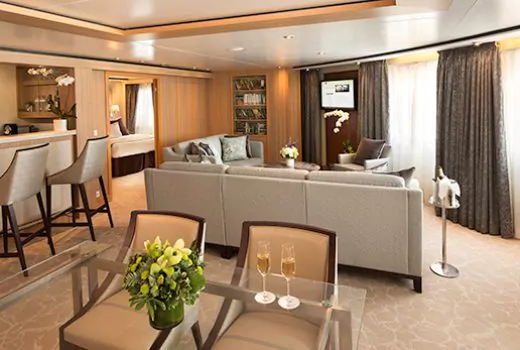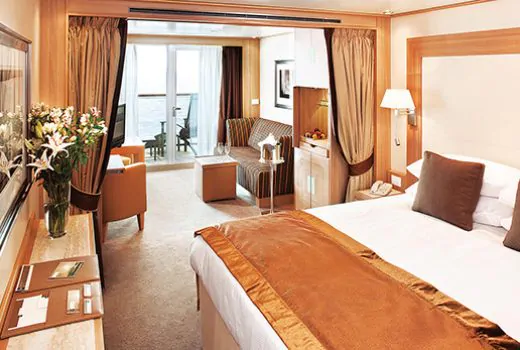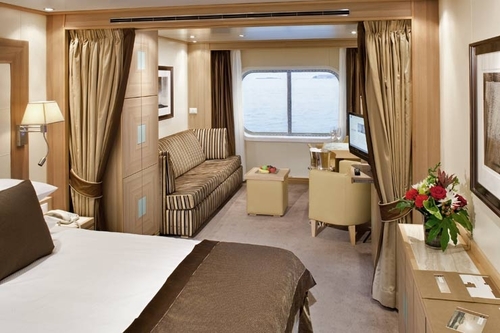Spring Circumnavigation Of Japan
- 4 Apr ‘26
- 21 nights
- Departing from Hong Kong
- Seabourn Sojourn
-
Inside price fromCall for price
-
Outside price from$19,199*/pp
-
Balcony price from$23,199*/pp
-
Suite price fromCall for price
YOUR ITINERARY
Hong Kong, China - Hong Kong, China - Kaohsiung, Taiwan - Hualien, Taiwan, Province of China - Ishigaki Island, Japan - Amami - Takamatsu, Japan - Beppu, Japan - Busan (Pusan), South Korea - Busan (Pusan), South Korea - Kanazawa, Japan - Kanazawa, Japan - Aomori, Japan - Miyako, Iwate, Japan - Yokohama, Japan
Hong Kong is divided into four sections: Hong Kong Island...
Hong Kong is divided into four sections: Hong Kong Island, Kowloon, the New Territories, and the numerous outlying islands. One hundred sixty-four square miles of dense real estate dominate Hong Kong Island, including enormous skyscrapers with futuristic architecture, opulent hotels, residential compounds on Victoria Peak, and some of the oldest Chinese communities in the region. All these elements create one of the most exotic and exciting ports of call in the world; one that is universally loved by tourists and its own enterprising citizens.
Hong Kong is divided into four sections: Hong Kong Island...
Hong Kong is divided into four sections: Hong Kong Island, Kowloon, the New Territories, and the numerous outlying islands. One hundred sixty-four square miles of dense real estate dominate Hong Kong Island, including enormous skyscrapers with futuristic architecture, opulent hotels, residential compounds on Victoria Peak, and some of the oldest Chinese communities in the region. All these elements create one of the most exotic and exciting ports of call in the world; one that is universally loved by tourists and its own enterprising citizens.
Visit the Dutch colonial Old City of Zuoying, or en...
Visit the Dutch colonial Old City of Zuoying, or enjoy the scenic seafront at Sizihwan and see the pesky Formosan rock macaques at the Shoushan Monkey Mountain nature park.
Located on the Pacific coast of Taiwan island, where the Hual...
Located on the Pacific coast of Taiwan island, where the Hualien River enters the sea, Hualien is a gateway to the island’s most spectacular natural splendors. It was here that Portuguese sailors in the 16th century caught a first glimpse of the grandeur and named the island Formosa. For a first visit nothing could beat a tour to the Taroko National Park, a swathe of mountain peaks, deep-cut canyons, rivers and waterfalls that is simply breathtaking. The rivers here have carved deep gorges into the marble cliffs, and attractions such as the Tunnel of Nine Turns make it even more dramatic. This path leads through marble-walled tunnels, interrupted by natural windows that let the light stream down from above, culminating in a rushing waterfall.
Closer to Taiwan than to Japan’s main islands...
Closer to Taiwan than to Japan’s main islands, the Yaeyama group is a volcanic archipelago known (though not widely) for its coral reefs and clear waters. Ishigaki is the main hub, and attracts mostly Japanese visitors with inside information about the Caribbean-like appeal of the place. A part of the Okinawa Prefecture, the island is ringed by beaches that vary from sandy expanses to whole strands made up entirely of broken, bleached and tumbled coral. The land itself is mostly given over to palm forests and pineapple plantations. Capes such as Hirakubozaki on the west side, or Uganzaki at the northern tip, are marked by lighthouses and offer nice views. At Kabira Bay no swimming is allowed, due to culture of black pearls, but glass-bottom boats offer views of the colorful sea life. Other beaches welcome snorkelers, swimmers and windsurfers.
The Amami Islands is an archipelago in the Satsunan...
The Amami Islands is an archipelago in the Satsunan Islands, which is part of the Ryukyu Islands, and is southwest of Kyushu. Administratively, the group belongs to Kagoshima Prefecture, Japan.
Takamatsu is located on Shikoku, the smallest of Japan’s ...
Takamatsu is located on Shikoku, the smallest of Japan’s four main islands, in the Kagawa Prefecture on the Seto Inland Sea. During the Edo period, it was famous for its seaside castle, one of the few with a moat utilizing seawater. The castle was destroyed during the Meiji period, and today the so-called Sunport waterfront project has substituted the Symbol Tower, Takamatsu’s tallest building, for the castle tower that once graced its flag. Long an important port for Japan, Takamatsu was nearly destroyed in 1945 by Allied incendiary bombing. A portion of the famous castle, including foundations and part of the wall, still strand on the city-center park, and there are plans to reconstruct more of it. The Ritsurin Koen garden, first built in the Edo period, survives, and makes a welcome oasis in the city, with a folk museum, rest houses and a tranquil tearoom among lakes, hills and groves of cherry trees that bloom in the spring and flame into color in the autumn. The Shikoku Mura is an open-air museum with traditional buildings gathered from all over Shikoku on display. The Yashima area boasts an Isamu Noguchi Museum dedicated to the late designer, artist and sculptor, with several traditional buildings he relocated and used as work spaces and galleries, along with many finished and unfinished sculptures. There is also a lovely Yashima Temple halfway up the mountain, and at the top, an observation deck with breathtaking views of the city and port.
Busan is the second largest city in South Korea, and t...
Busan is the second largest city in South Korea, and the country’s seaside connection to Japan and the West. Lovely urban scenery, the Pusan International Film Festival, and near-by hot springs has made Busan a popular leisure destination. Busan has the sophistication of a major city, as well as famous beaches that lure visitors from all over the world. The city is a microcosm of South Korea, a nation whose economic success often obscures, to Westerners, one of Asia’s most sophisticated and venerable cultures.
Busan is the second largest city in South Korea, and ...
Busan is the second largest city in South Korea, and the country’s seaside connection to Japan and the West. Lovely urban scenery, the Pusan International Film Festival, and near-by hot springs has made Busan a popular leisure destination. Busan has the sophistication of a major city, as well as famous beaches that lure visitors from all over the world. The city is a microcosm of South Korea, a nation whose economic success often obscures, to Westerners, one of Asia’s most sophisticated and venerable cultures.
One of Japan’s best-preserved cities, Kanazawa esc...
One of Japan’s best-preserved cities, Kanazawa escaped war damage and natural disasters to reward visitors with a wealth of architecture as an important clan castle town from the mid-17th century until the middle of the 19th. The mighty Kanazawa Castle did not survive intact, but its famous Ishikawa Gate, the Sunjikken Longhouse and lavish Kenrokuen Garden hint at the grandeur. Of special note are the surviving Higashi Geisha District and Samurai District streets. The Temple area holds the Myoryuji Temple with its hidden passages and secret doors giving it the nickname the Ninja Temple. The Oyamajinja Shrine is a later addition, its three-story gate with impressive stained glass windows reveal a Dutch influence. Museums worth exploring include the Kanazawa Yasue Gold Leaf Museum, with examples of the arts and crafts using the pure gold decoration for which the region is famous. Another museum celebrates the Buddhist philosopher D. T. Suzuki, credited with introducing Zen philosophy to the West, and a striking 21st Century Museum of Contemporary Art. Nearby Mt. Utatsu is renowned for its Three Shrines.
VIEW CRUISES
One of Japan’s best-preserved cities, Kanazawa...
One of Japan’s best-preserved cities, Kanazawa escaped war damage and natural disasters to reward visitors with a wealth of architecture as an important clan castle town from the mid-17th century until the middle of the 19th. The mighty Kanazawa Castle did not survive intact, but its famous Ishikawa Gate, the Sunjikken Longhouse and lavish Kenrokuen Garden hint at the grandeur. Of special note are the surviving Higashi Geisha District and Samurai District streets. The Temple area holds the Myoryuji Temple with its hidden passages and secret doors giving it the nickname the Ninja Temple. The Oyamajinja Shrine is a later addition, its three-story gate with impressive stained glass windows reveal a Dutch influence. Museums worth exploring include the Kanazawa Yasue Gold Leaf Museum, with examples of the arts and crafts using the pure gold decoration for which the region is famous. Another museum celebrates the Buddhist philosopher D. T. Suzuki, credited with introducing Zen philosophy to the West, and a striking 21st Century Museum of Contemporary Art. Nearby Mt. Utatsu is renowned for its Three Shrines.
VIEW CRUISES
Located on the northernmost harbor of Japan’s ma...
Located on the northernmost harbor of Japan’s main island of Honshu, Aomori is the traditional departure point for Hokkaido Island. It is famous for its summer Nebuta Matsuri festival, and has a museum that recaptures the color and pageantry for those who visit in other seasons. Explore the earliest prehistoric cultures of Japan at the Sannai Maruyama archaeological site, or visit the Aomori Museum of Art for a look at more contemporary works. Nearby Hirosaki boasts a 17th Century castle. Visit either the Auga or the Furukawa public fish market, where you can create your own version of a donburi rice bowl with pristinely fresh local seafood.
YOUR SHIP - The Seabourn Sojourn
Seabourn Sojourn enchants her guests with an array of public areas scaled to encourage a relaxed sociability. One of the most unusual features of Seabourn Sojourn and her sisters is Seabourn Square, an ingenious “living room” that replaces the traditional cruise ship lobby with a welcoming lounge filled with easy chairs, sofas and cocktail tables; making it more inviting and relaxing on a small ship cruise. An enclave in its center houses knowledgeable concierges discreetly seated at individual desks.
Seabourn Sojourn enchants her guests with an array of public areas scaled to encourage a relaxed sociability. One of the most unusual features of Seabourn Sojourn and her sisters is Seabourn Square, an ingenious “living room” that replaces the traditional cruise ship lobby with a welcoming lounge filled with easy chairs, sofas and cocktail tables; making it more inviting and relaxing on a small ship cruise. An enclave in its center houses knowledgeable concierges discreetly seated at individual desks.
Beauty Salon
Facial Treatments
Massage
Sauna
Spa
Swimming Pool
Thalassotherapy Pool
Whirlpool
In-Suite Service
Patio Grill
Sky Bar
The Colonnade
The Restaurant
The Restaurant 2
Gym
Sports Deck
Description
Seabourn Sojourn enchants her guests with an array of public areas scaled to encourage a relaxed sociability. One of the most unusual features of Seabourn Sojourn and her sisters is Seabourn Square, an ingenious “living room” that replaces the traditional cruise ship lobby with a welcoming lounge filled with easy chairs, sofas and cocktail tables; making it more inviting and relaxing on a small ship cruise. An enclave in its center houses knowledgeable concierges discreetly seated at individual desks.
Relaxation
Beauty Salon
Facial Treatments
Massage
Sauna
Spa
Swimming Pool
Thalassotherapy Pool
Whirlpool
Food and Drink
In-Suite Service
Patio Grill
Sky Bar
The Colonnade
The Restaurant
The Restaurant 2
Fitness
Gym
Sports Deck
STATEROOMS

suite

balcony


